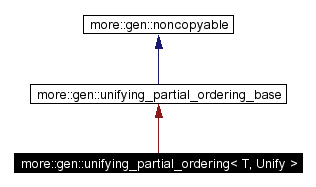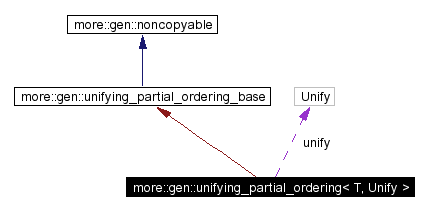
#include <more/gen/unifying_partial_ordering.h>
Inheritance diagram for more::gen::unifying_partial_ordering:


 . More...
. More... . More...
. More... is implied by the given constraints. More...
is implied by the given constraints. More... is implied by the given contraits. More...
is implied by the given contraits. More...x. More...x. More...x. More...x. More...it_out the set of elements  . More...
. More...it_out the set of elements  . More...
. More...it_out the set of elements  . More...
. More...
|
|||||
|
A bidirectional iterator used by supremum_range.
|
|
|||||
|
A bidirectional iterator used by supremum_range.
|
|
|||||
|
|
|
|||||
|
|
|
|||||||||
|
construct a partial ordering with only infimun and supremum elements.
|
|
||||||||||
|
construct a partial ordering with the given unify function object.
|
|
||||||||||
|
contruct a deep copy.
|
|
|||||||||
|
destructs the partial ordering. All elements created from the ordering will be invalidated. |
|
|||||||||
|
clear a partial ordering. All elements of the ordering are invalidated. |
|
||||||||||||||||
|
imposes the constraint
Equivalent to |
|
||||||||||||||||
|
imposes the constraint
|
|
||||||||||||||||||||
|
|
|
||||||||||||||||||||
|
copyies to
|
|
||||||||||||||||||||||||
|
|
|
||||||||||||||||||||||||
|
copies to
|
|
||||||||||||||||||||
|
|
|
||||||||||||||||||||
|
copies to In contrast to full orderings, there may be more than one element fulfilling this condition. |
|
||||||||||||||||
|
returns true iff
Equivalent to |
|
||||||||||
|
Returns a range of the infimums of
See |
|
||||||||||
|
Returns a range of the infimums of
Note that the value_type of the iterator is |
|
||||||||||||||||||||||||
|
insert nodes in (e_min, e_max) into (e_min_dest, e_max_dest).
|
|
||||||||||||||||
|
insert a range of values. |
|
|||||||||
|
create a new default constructed element.
|
|
||||||||||
|
create a new element with the given value.
|
|
|||||||||
|
returns the element which is greater than any other element. It is dereferenceable with an lvalue as the result. |
|
|||||||||
|
returns the element which is greater than any other element. It is derferenceable. |
|
|||||||||
|
returns the element which is less than any other element. It is dereferenceable with an lvalue as the result. |
|
|||||||||
|
returns the element which is less than any other element. It is dereferenceable. |
|
||||||||||
|
assign a deep copy.
|
|
||||||||||||||||
|
returns true iff
|
|
||||||||||
|
Returns a range of the supremums of
See |
|
||||||||||
|
Returns a range of the supremums of
See |